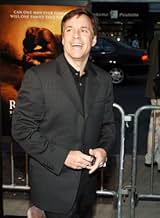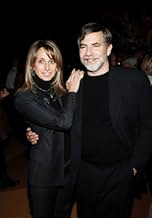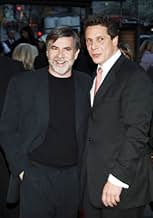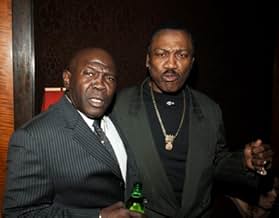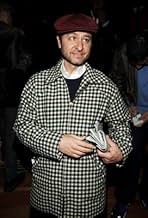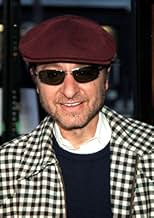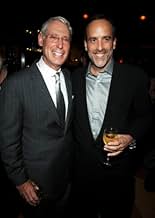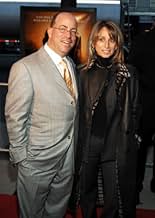Añade un argumento en tu idiomaA story of violence, love, sex, politics and media centered around the life of Griffith, a six-time world welterweight champion.A story of violence, love, sex, politics and media centered around the life of Griffith, a six-time world welterweight champion.A story of violence, love, sex, politics and media centered around the life of Griffith, a six-time world welterweight champion.
- Premios
- 2 nominaciones en total
Don Dunphy
- Self
- (metraje de archivo)
Benny Paret
- Self
- (metraje de archivo)
Jimmy Powers
- Self
- (metraje de archivo)
Reseñas destacadas
An extremely well done documentary which reaches well beyond the boundaries of sports. Even though it follows the boxing career of Emile Griffith, its a poignant story that touches upon an era of innocence in America that is long gone. Sports writer, Pete Hamill made an early comment in the film in which he states that even though it is 1962, America was still living in the '50s. Being almost 2 decades removed from our World War II war heroes, America was on the cusp of a new time. A time where death could be seen on TV. A time where our potential new heroes would be scrutinized and seen as human with frailties and tastes that may be different from what was perceived as the norm. I would recommend this documentary to all, not only sports fans. But, only by being a sports fan, did I hear about it on commercial TV (which I don't watch much of). I look forward to seeing it again, hopefully, on DVD soon. It would be unfortunate if people judge this as only as a sports documentary.
I am a Sergeant in the Army stationed in Korea and was unable to watch this amazing film when it premiered on TV. I think they had an inkling of just how amazing it would be because they showed it without commercials. This is a heart-wrenching story not only of boxing but of society as well and how we have changed over the years. The movie opens the fatal night of March 24, 1962 with Don Dunphy announcing the fight between Emile Griffith and Benny "Kid" Paret with the title at stake. The two had already fought twice splitting the victory between them. They were sort of the Ali-Frazier of the middleweight division. Paret had cruelly taunted his challenger before the fight calling him "maricon" (faggot). This was a shocking slur the press didn't even report at the time. Griffith had to be restrained from attacking him at the weigh in. This fight will always be one of boxing's most infamous because it was the first time a nationwide audience saw a man killed before their eyes. Ironically, even before this fight Griffith had not been known for being savage in the ring or a hard puncher. His record going into the fight was 28-3 with only 10 knockouts. However, in Round 13, he pinned Paret against the ropes and delivered the most savage beating you will ever see a boxer give another. In less then ten seconds he delivers over twenty devastating blows to the head. The referee did not stop the fight in time and Paret dies ten days later. There were so many far reaching aspects of this tragic night in 1962. Many hypocritical politicians called for the abolishment of boxing. It was years before fights were ever televised again. Referee Ruby Goldstein, who had had a distinguished career otherwise, never called another fight. However, the most devastating consequences that night were for poor Emile Griffith as this documentary makes painfully clear. Today, there is no big deal about a celebrity admitting their gay. It seems you cannot have a hit TV show, for example, without a character being gay. We put people like Ellen DeGeneres up on pedestals and make them icons of our culture. However, in the world of 1962, an admission of this was career suicide especially in the manly sport of boxing. How could a champion be gay? Griffith's personal life is his own business, but its heartbreaking watching this film and how the tragedy basically ruined this poor man. Griffith fought another fifteen years and became a six time champ. He was never the same fighter however. He fought another eighty bouts after March 24, 1962 but only scored twelve knockouts. He relied on his superb boxing ability rather then brute force to win. He admitted he was terrified of killing another. What shocked me is that champions of his era made nowhere near the outrageous purses of those today. Gil Clancy, his trainer, pointed out that it was common for even a champion to get only $50,000 for a fight. Like so many, Griffith stayed in boxing long after he should have retired. He lost twelve of his final twenty three fights. Today Griffith is a broken old man who requires full time care. He suffers from pugilistic dementia and also from nightmares still. I think the most touching moments of this film are the end where Paret's son embraces the weeping old champion and tells him he is forgiven.
10zelley-1
As an amateur boxer in the Sixties, it was always great to watch some of the great boxers in action, and Emile Griffith was a Champion of Champions.
It was also sad for Emile to be part of the burden of the tragedy in1962.
OVER THE YEARS IT WAS GREAT TO WATCH HIS BOUTS WITH THE LIKES OF Joey Archer and many others.
Watching the Emile Griffith story was like a trip down Memory Lane with a positive ending. To see Emile and Benny Paret Jr. together in the closing scenes was like seeing some dark clouds being gently blown away by a breath of fresh air.
Throughout the show it was great to see old faces from the past such as Gene Fullmer, Gaspar Ortega, Jose Torres, but most of all to see Griffith in action within the ring and his life beyond the limelight.
A river of tears,teardrop by lonely teardrop, can never wash away the pain and sorrow for the Paret family and their loss. But, to have Benny Jr. join together with Emile Griffith in their meeting was the highest and brightest moment of movie magic.
I can't rate or compare Ring of Fire: The Emile Griffith Story to any other movie, TV show or slice of history. It stands alone as a unique treasure with endless value.
It was also sad for Emile to be part of the burden of the tragedy in1962.
OVER THE YEARS IT WAS GREAT TO WATCH HIS BOUTS WITH THE LIKES OF Joey Archer and many others.
Watching the Emile Griffith story was like a trip down Memory Lane with a positive ending. To see Emile and Benny Paret Jr. together in the closing scenes was like seeing some dark clouds being gently blown away by a breath of fresh air.
Throughout the show it was great to see old faces from the past such as Gene Fullmer, Gaspar Ortega, Jose Torres, but most of all to see Griffith in action within the ring and his life beyond the limelight.
A river of tears,teardrop by lonely teardrop, can never wash away the pain and sorrow for the Paret family and their loss. But, to have Benny Jr. join together with Emile Griffith in their meeting was the highest and brightest moment of movie magic.
I can't rate or compare Ring of Fire: The Emile Griffith Story to any other movie, TV show or slice of history. It stands alone as a unique treasure with endless value.
The film "Ring of Fire" centers around the three historic Emile Griffith Benny "Kid" Paret Welterweights Championship bouts. The first taking place in Miami Beach on April 1, 1961 with Griffith looking sluggish and behind on points suddenly coming to life and wrestled the championship belt away from Paret flooring him in the 13th round with a double left hood followed by a straight right putting the champ on Queer Street. The second championship fight between the two welterweights took place on September 30, 1961 in New York's old Madison Square Garden and went the full 15, the distance, rounds. Paret surprising many fight fans in attendance and watching on TV by winning a split decision and regaining the championship that he lost to Griffith six months earlier.
As the two fighters were about to weigh in on the eve of their rubber match again in the Garden on March 24, 1962 bad blood had developed between the two pugilists to the point where they almost had it out right there and then at the weigh in before he match. Paret started needling Griffith, more to disrupt his concentration on the fight then anything else, about his sexuality calling him a "queer or homosexual", to put it mildly, in Spanish. These uncalled for remarks on Paret's part really started to get under Griffith's skin as well as enraged and set him off later in the ring.
In the fight there was no love lost between the two with both Griffith and Paret slugging it out toe to toe for eleven rounds. Griffith earlier in the sixth was knocked down, for the first time in his professional boxing career, by a devastating one two right left combination by a revitalized Paret. Paret then started slowly taking control of the fight in the middle and later rounds and leading on points, in the opinion of many at ringside, as the fateful and fatal 12th round started.
The 12th round for the most part was uneventful until with about a minute left Griffith suddenly caught Paret with a hooking solid right that stunned him knocking him into the ropes. Before Paret could counter or even cover up Griffith swarmed all over him like a windmill with two dozen punches with Paret not throwing a single one in return. Paret was left unconscious and propped up against the ropes with the fight stopped by referee Ruby Goldstein with 51 seconds left in the round. Benny "Kid" Parets skull was so baldly battered that he, ten days later, died in Roosevealt Hospital from a massive blood clot without regaining consciousness.
Even though were shown what Emile Griffith did in his boxing career since his last fight with Benny "Kid" Paret it was that fight that haunted him for the rest of his days in and out of the ring. The Paret fatal boxing match not only had caused Griffith to lose his killer instinct in the ring but may very well have caused him to become an alcoholic. It wasn't Until he met with Benny "Kid" Parets son some 40 years later and with Benny Jr kindness love and understanding that Griffith finally made peace with himself. Brutal but extremely moving documentary about a brutal sport Professional Boxing and those who participate in it both in and out of the ring.
Mrs. Paret left a widow with an infant son Benny Jr. after her husbands untimely death has never really recovered from the shock that took Benny Sr. away from her on March 24, or really officially April 4, 1962. It's only her son Benny Jr. whom we see at the end of the movie finally meeting face to face with the man Emile Griffith who was responsible for his fathers death. The scene between the two is one of most emotionally packed encounters even put on the big or small screen that no amount of acting could possibly duplicated.
Emile Griffith himself had suffered his fair amount of tragedies since his final battle with Benny Paret. Not only losing the championship belt that he took from the fallen champion that terrible night but losing almost everything that he won in the ring leaving him broke. Later after getting a job helping out young men in prison to go straight and, if they have any talent, pursue a boxing career he himself was almost beaten to death in 1992. That's when Griffith was brutally attacked one evening, leaving dead drunk from a NYC bar, and robbed by a gang of thugs who beat the 55 year-old ex-champ to the point that he almost died from kidney failure.
We get to see in the end how Emile Griffith finally got closer from the demons that had been tormenting him ever since that horrible evening some 45 years ago when he should have been celebrating the biggest victory he ever won in the ring. Griffith instead went into a long tail-spin that didn't seem to ever end. It wasn't until he finally got to see and talk to the son, Benny Paret Jr, of the person he killed that night in he boxing ring that his life took a sudden turn for the better. It's then that he saw that forgiveness from Benny Jr is far more powerful then the hate that he had for his dad that not only lead to the psychical death of Benny "Kid" Paret but, until he finally got to talk to Benny Jr, the spiritual and emotional death of himself as well.
As the two fighters were about to weigh in on the eve of their rubber match again in the Garden on March 24, 1962 bad blood had developed between the two pugilists to the point where they almost had it out right there and then at the weigh in before he match. Paret started needling Griffith, more to disrupt his concentration on the fight then anything else, about his sexuality calling him a "queer or homosexual", to put it mildly, in Spanish. These uncalled for remarks on Paret's part really started to get under Griffith's skin as well as enraged and set him off later in the ring.
In the fight there was no love lost between the two with both Griffith and Paret slugging it out toe to toe for eleven rounds. Griffith earlier in the sixth was knocked down, for the first time in his professional boxing career, by a devastating one two right left combination by a revitalized Paret. Paret then started slowly taking control of the fight in the middle and later rounds and leading on points, in the opinion of many at ringside, as the fateful and fatal 12th round started.
The 12th round for the most part was uneventful until with about a minute left Griffith suddenly caught Paret with a hooking solid right that stunned him knocking him into the ropes. Before Paret could counter or even cover up Griffith swarmed all over him like a windmill with two dozen punches with Paret not throwing a single one in return. Paret was left unconscious and propped up against the ropes with the fight stopped by referee Ruby Goldstein with 51 seconds left in the round. Benny "Kid" Parets skull was so baldly battered that he, ten days later, died in Roosevealt Hospital from a massive blood clot without regaining consciousness.
Even though were shown what Emile Griffith did in his boxing career since his last fight with Benny "Kid" Paret it was that fight that haunted him for the rest of his days in and out of the ring. The Paret fatal boxing match not only had caused Griffith to lose his killer instinct in the ring but may very well have caused him to become an alcoholic. It wasn't Until he met with Benny "Kid" Parets son some 40 years later and with Benny Jr kindness love and understanding that Griffith finally made peace with himself. Brutal but extremely moving documentary about a brutal sport Professional Boxing and those who participate in it both in and out of the ring.
Mrs. Paret left a widow with an infant son Benny Jr. after her husbands untimely death has never really recovered from the shock that took Benny Sr. away from her on March 24, or really officially April 4, 1962. It's only her son Benny Jr. whom we see at the end of the movie finally meeting face to face with the man Emile Griffith who was responsible for his fathers death. The scene between the two is one of most emotionally packed encounters even put on the big or small screen that no amount of acting could possibly duplicated.
Emile Griffith himself had suffered his fair amount of tragedies since his final battle with Benny Paret. Not only losing the championship belt that he took from the fallen champion that terrible night but losing almost everything that he won in the ring leaving him broke. Later after getting a job helping out young men in prison to go straight and, if they have any talent, pursue a boxing career he himself was almost beaten to death in 1992. That's when Griffith was brutally attacked one evening, leaving dead drunk from a NYC bar, and robbed by a gang of thugs who beat the 55 year-old ex-champ to the point that he almost died from kidney failure.
We get to see in the end how Emile Griffith finally got closer from the demons that had been tormenting him ever since that horrible evening some 45 years ago when he should have been celebrating the biggest victory he ever won in the ring. Griffith instead went into a long tail-spin that didn't seem to ever end. It wasn't until he finally got to see and talk to the son, Benny Paret Jr, of the person he killed that night in he boxing ring that his life took a sudden turn for the better. It's then that he saw that forgiveness from Benny Jr is far more powerful then the hate that he had for his dad that not only lead to the psychical death of Benny "Kid" Paret but, until he finally got to talk to Benny Jr, the spiritual and emotional death of himself as well.
Intelligent, interesting and occasionally moving, this tells the story of boxer Emile Griffith, a gentle warrior, who accidentally killed a man in the ring, and who may have been gay at a time (the early 60s on) when an admission of that by an athlete was unthinkable.
Indeed, one of the frustrating and sad things about the film is that Griffith still insists on keeping his sexuality mysterious, which keeps the film from deeply exploring a potentially very powerful part of Griffith's story. It feels awkward that the subject is so front and center in some ways (he was mocked with a slur for being homosexual by the man he beat to death in the ring), yet so danced around in others.
But there's plenty here to hold your interest. Griffith's career arc, his jovial, likable personality, the great use of archival footage, the emotional and career complexities of taking a life all make for a documentary that while perhaps not all it could be (and a bit repetitive at times) is still very worth watching.
Indeed, one of the frustrating and sad things about the film is that Griffith still insists on keeping his sexuality mysterious, which keeps the film from deeply exploring a potentially very powerful part of Griffith's story. It feels awkward that the subject is so front and center in some ways (he was mocked with a slur for being homosexual by the man he beat to death in the ring), yet so danced around in others.
But there's plenty here to hold your interest. Griffith's career arc, his jovial, likable personality, the great use of archival footage, the emotional and career complexities of taking a life all make for a documentary that while perhaps not all it could be (and a bit repetitive at times) is still very worth watching.
¿Sabías que...?
- CuriosidadesThroughout the entire documentary, no mention at all is made of Benny Paret's second son Alberto, born three months after Benny's death.
Selecciones populares
Inicia sesión para calificar y añadir a tu lista para recibir recomendaciones personalizadas
Detalles
- Fecha de lanzamiento
- País de origen
- Sitio oficial
- Idioma
- Ver más compañías en los créditos en IMDbPro
- Duración1 hora 27 minutos
- Color
Contribuir a esta página
Sugerir un cambio o añadir el contenido que falta

Principal laguna de datos
By what name was Ring of Fire: The Emile Griffith Story (2005) officially released in Canada in English?
Responde
